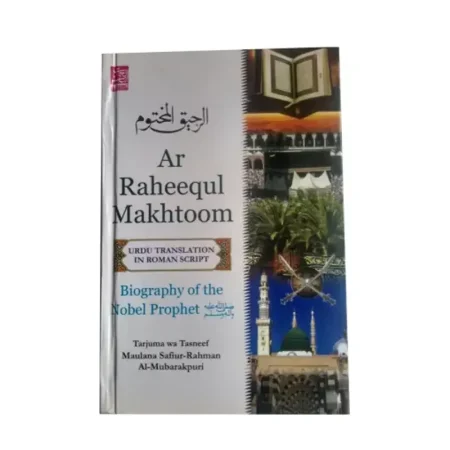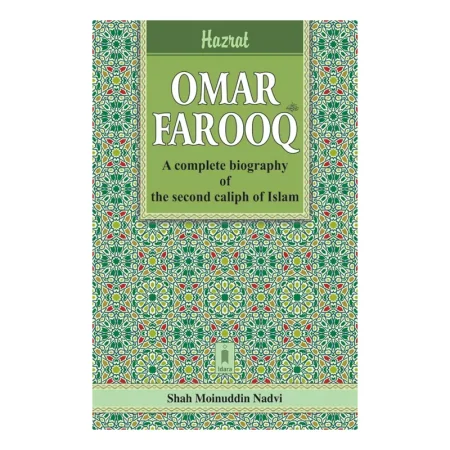Al Hasanat The Noble Life Of Muhammad S A W Hayat E Tayyaba Muhammad Abdul Hai English
₹180.00
- The Noble Life Of Muhammad (S.A.W.) Hayat-E-Tayyaba Muhammad Abdul Hai Al Hasanat (English)
Out of stock
Email when stock available

Al Hasanat The Noble Life Of Muhammad S A W Hayat E Tayyaba Muhammad Abdul Hai English
₹180.00Request a Call Back
This contact form is available only for logged in users.
- Delivery & Return
How Does The Delivery Process Work ?
- Once Our System Processes Your Order, Your Products Are Inspected Thoroughly To Ensure They Are In Perfect Condition.
- After They Pass Through The Final Round Of Quality Checks, They Are Packed And Handed Over To Our Trusted Courier Partners.
- Our Delivery Partners Then Bring The Package To You At The Earliest Possibility. In Case, They Are Unable To Reach Your Provided Address Or At A Suitable Time, They Will Contact You To Resolve The Issue.
How Are Items Packed ?
We Package Our Products In Corrugated Boxes, Which Are Covered With 3 Layer Protection. Each Individual Product Is Packed In Bubble Wrap While Fragile Items Like Bottles Are Safely Secured With Additional Bubble Wrap. We Pride Ourselves On The Quality Of Our Packaging.What Is The Range Of Locations To Which Daarul Kitab & Islamic Store Ships It’s Products ?
We Shipped Our Products Pan India!My Order Has Been Shipped, How Can I Track It ?
Once Your Order Has Been Dispatched, You Will Receive An Email And SMS With Tracking Details.You Can Track The Status Of Your Order Within 24 – 48 Hours After Your Order Is Dispatched From Our Warehouse.Following Are Some Of Our Trusted Courier Partners: eKart Logistics, BlueDart, Delhivery, Xpressbees, Ecom Express, DTDC & ShadowfaxWhat Is The Estimated Delivery Time ?
It Takes 3-7 Business Days To Deliver The Order Once Order Has Been Dispatched.Though We Keep 95% Of Our Catalog In Our Inventory, Certain Products Need To Be Sourced Directly From The Brand Itself So That We Can Live Up To Our Promise Of Providing Fresh, Non-expired Products.Are There Any Shipping Charges Applicable To My Order ?
We Have Different Shipping Charges For Different Zones Which Start From 60₹ To 100₹ Is Applied To All Orders Below ₹1999, While There Is Free Shipping For All Orders Above ₹1999Note: Please Take A Video/Photos While Opening A Order You Received We Need It If Anything Goes Wrong With You Order Between Journey Of Our Warehouse To Your Doorstep, If You Find Order Is Damaged Or Intact Please Do Not Accept The Order Delivery .
Disclaimer: Any Complaints Related To Product/Delivery Should Be Brought To Our Notice Within 48 Hours From The Time Of Delivery.
Help
Give us a shout if you have any other questions and/or concerns. Email: support@daarulkitab.com Phone: +918755553311 WhatsApp: +918755553311 - Ask a Question

Al Hasanat The Noble Life Of Muhammad S A W Hayat E Tayyaba Muhammad Abdul Hai English
₹180.00Ask a Question
This contact form is available only for logged in users.
Muhammad[n 1] (Arabic: مُحمّد, pronounced [muħammad];[n 2] c. 570 CE – 8 June 632 CE)[1] was the founder of Islam.[2] According to Islamic doctrine, he was a prophet, sent to present and confirm the monotheistic teachings preached previously by Adam, Abraham, Moses, Jesus, and other prophets.[2][3][4][5] He is viewed as the final prophet of God in all the main branches of Islam, though some modern denominations diverge from this belief.[n 3] Muhammad united Arabia into a single Muslim polity, with the Quran as well as his teachings and practices forming the basis of Islamic religious belief. Born approximately 570 CE in the Arabian city of Mecca, Muhammad was orphaned at the age of six.[6] He was raised under the care of his paternal uncle Abu Talib and Abu Talib’s wife Fatimah bint Asad.[7] In later years he would periodically seclude himself in a mountain cave named Hira for several nights of prayer. When he was 40, Muhammad reported being visited by Gabriel in the cave,[8][9] and receiving his first revelation from God. Three years later, in 610,[10] Muhammad started preaching these revelations publicly,[11] proclaiming that “God is One”, that complete “submission” (islām) to God[12] is the right course of action (dīn),[13] and that he was a prophet and messenger of God, similar to the other prophets in Islam.[14][15][16] The followers of Muhammad were initially few in number, and experienced hostility from Meccan polytheists. He sent some of his followers to Abyssinia in 615 to shield them from prosecution, before he and his followers migrated from Mecca to Medina (then known as Yathrib) in 622. This event, the Hijra, marks the beginning of the Islamic calendar, also known as the Hijri Calendar. In Medina, Muhammad united the tribes under the Constitution of Medina. In December 629, after eight years of intermittent fighting with Meccan tribes, Muhammad gathered an army of 10,000 Muslim converts and marched on the city of Mecca.
| Weight | 400 g |
|---|---|
| Dimensions | 21.5 × 14 × 1.65 cm |
Related Products
- Ar Raheequl Makhtoom Urdu Translation In Roman Script Maulana Safiur-Rahman Al-Mubarakpuri Al Hasanat (English)
6 in stock
- Name: Jadeed Muawin Namaz
- Writer : Maulana Sayed Jalaluddin Umri
- Publisher: Manshurat
- Language: Urdu
- Alexander The Great Anjum Sultan Shahbaz Al Hasanat (Urdu)
3 in stock
- Biography Of Hadrat Moulana Muhammad Yusuf Sahib(R.A) Amire Tabligh Maulana Mufti Azizur-Rehman Bijnori Idara (English)
3 in stock
- Weight 3.2 kg
- Author/Translator Altaf Ahmad Azmi
- Language Arabic-Urdu
- Binding Hardbound
- Pages 1092
1 in stock
- Aakhri Ahd-E-Mughliya Ka Hindustan Dr Mubarak Ali Al Hasanat (Urdu)
2 in stock
- Hazrat Omar Farooq A Complete Biography Of The Second Caliph Of Islam Shah Moinuddin Nadvi Idara (English)
11 in stock
- Hasan Al Banna Shaheed Ek Mutala Abdul Gaffar Aziz Manshurat (Urdu)
3 in stock
- Life And Work Khwaja Ghareeb Nawaz ( Dr.Z.Hasan Sharib ) Adam English
1 in stock
- Guldasta-E-Nabavi Quiz ( Ghais Jehlami ) Al Hasanat Urdu
1 in stock
- Hazrat Abu Bakar Siddique A Complete Biography Of The First Caliph Of Islam Shah Moinuddin Nadvi Idara (English)
12 in stock
- Name: The Biography Of Ali Abi Taalib
- Writer: Sallabi
- Publisher: Darussalam
- Language: English














